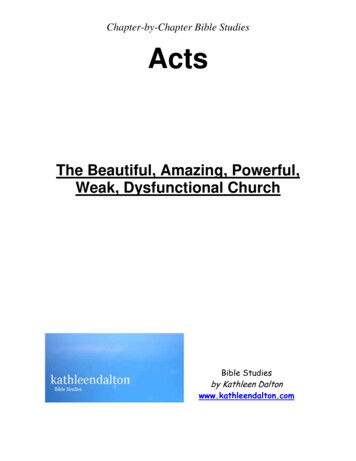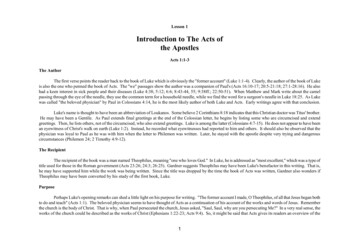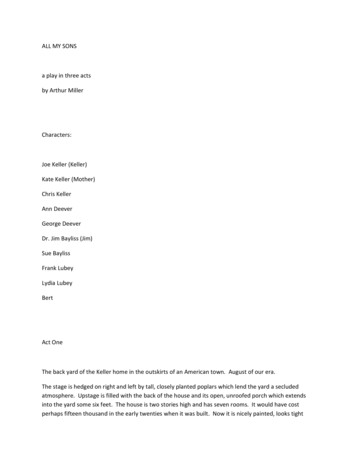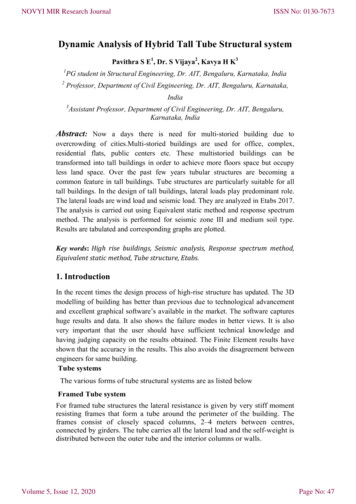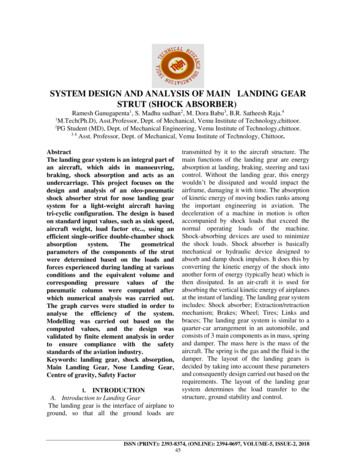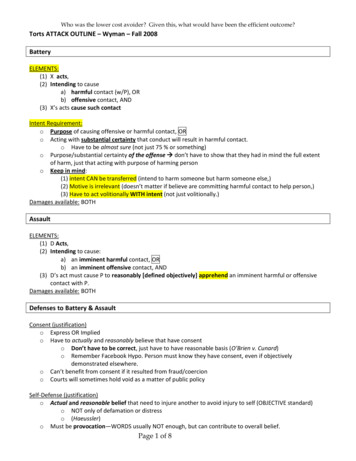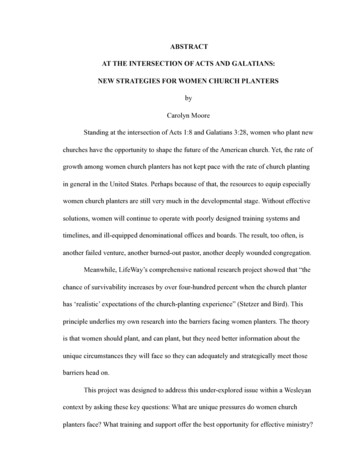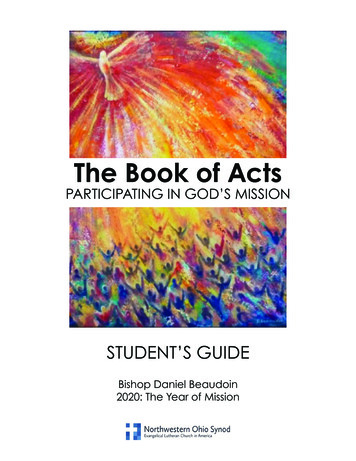
Transcription
The Book of ActsPARTICIPATING IN GOD’S MISSIONSTUDENT’S GUIDEBishop Daniel Beaudoin2020: The Year of Mission
Table of ContentsTable of Contents pg. 1Welcome Letter pg. 2Tips for Group Members pg. 3-4Bible Study Resources pg. 5Book of Acts: A Brief Introductionpg. 6Book of Acts: An Outline pg. 7Memory Verses pg. 8Studies and ConversationStudy #1Sent, But Never Settledpg. 9-12Study #2Disciples of Jesus Practice What They Preachpg. 13-16Study #3Equipping Leaders for Missionpg. 17-20Study #4Strengthening Parishes pg. 21-24Study #5Launching New Communitiespg. 25-28Study #6For the Renewal of the Worldpg. 29-32Cover artwork:Veronica Dimae, “Pentecost,” 2010. Media acrylic on stretch canvas,130 x 100cm. (Australia)
Welcome LetterDear Friends in Christ,Welcome to 2020: The Year of Mission. Our focus this year will be on the Mission of God.God has a mission, and God’s mission has a church. In Scripture, we encounter theTriune God working to restore and renew all things. The Bible begins with creation andends with the promise of a new creation. The Triune God is working to renew everyoneand everything and invites us to participate.The mission of the Northwestern Ohio Synod is a participatory mission:Sent by the Crucified and Risen Jesus toMake Disciples, Equip Leaders, Strengthen Parishes, and Launch New Communitiesfor the Renewal of Northwestern Ohio and the World.During 2020: The Year of Mission, we will aspire to grow as we participate in God’s Missionthrough three distinct practices:1. To discern the Mission of God through prayer, Scripture, and sacred conversation;2. To align the identity and work of God’s people and parishes with the Mission of God;3. To participate in the Mission of God for the renewal of Northwest Ohioand the world.One of my favorite Bible verses related to the Mission of God is recorded at the end of theGospel of John, when the crucified and risen Jesus appears to His followers. The Bible verse isJohn 20:21, which will serve as our 2020 Year of Mission memory verse.Jesus said to them again, “Peace be with you.As the Father has sent me, so I send you” (John 20:21).This powerful verse reminds us that Jesus did not call us to be a settled church,but a church sent to participate in God’s mission!What follows is a six session Bible study on the Book of Acts. Open your Bible, gather with agroup of friends, get outside the four walls of the congregation, and learn what God desiresto teach you. But, be careful. Be very, very careful. Because God’s Word has the power totransform people and communities from who we are into the people and communities thatGod longs for us to be.Let us pray, O God, you have called your servants to ventures of which we cannot seethe ending, by paths as yet untrodden, through perils unknown. Give us faith to go out withgood courage, not knowing where we go, but only that your hand is leading us and yourlove supporting us; through Jesus Christ our Lord. Amen.(Evangelical Lutheran Worship pg. 317)Blessings,Bishop Daniel BeaudoinNovember 28, 2019 Day of Thanksgiving2
Tips for Group Members“. you will be my witnesses in Jerusalem, in all Judea and Samaria,and to the ends of the earth” (Acts 1:8b).In the first chapter of the Book of Acts, the crucified and risen Jesus commissions His followersto be “witnesses” (1:8b). Jesus charges His followers to participate fully in God’s mission bymaking disciples (Matthew 28:19), preaching the good news (Mark 16:15),proclaiming repentance and the forgiveness of sins (Luke 24:47),following Jesus (John 21:22), and witnessing “. to the ends of the earth” (Acts 1:8b).One of the best ways to discern God’s mission is to gather in community for prayer, Scripture,and conversation.Thank you for your willingness to attend this Bible study. Now, you don’t need to be a Biblescholar to attend a Bible study. You simply need to be open. Open to experiencing newthoughts, great discussion, and the potential for real growth. Think of a coffee shop conversation rather than a classroom lecture. These studies can be experienced in a variety of settings, though I would encourage you to follow the pattern of the original apostles and sharethese studies out in the “marketplace” (outside the four walls of the church building). Younever know who might be watching, listening, and wondering. These studies are intended tolast around 60 minutes.Below are some suggestions to assist you.*Before the Study1. Pray. Pray that God would guide you to learn and participate faithfully.Pray for your Bible study leader and the participants who will gather for conversationand discussion. Ask God to open your hearts and minds to hear God’s Word that itmay motivate you to a new way of thinking and being.2. Come to the study prepared. Read and then slowly re-read the assigned Biblepassage. Write down particular and peculiar words and phrases you have questionsabout. Bring those questions to the group gathering.3. Carefully work through the lesson. Take time to meditate and reflect on eachquestion. Write your responses in the space provided. Please set aside 60-90 minutesfor prep time each week.4. Consider ways to apply the assigned Bible passage to your life.3
Tips for Group MembersDuring the Study1. Bring the necessary materials to your study: Bible, student guide, pen, or pencil.2. Some tips for participating in discussion:A. Be willing to participate. The leader will not be lecturing, but leading aconversation. Join the conversation.B. Stick to the topic being discussed. Try to avoid drifting off on tangents.C. Be attentive to other participants. Listen to what they are sharing.You may be surprised by their insights. Also, be affirming. This will encouragesome of the more hesitant participants to share.D. Be careful not to dominate the discussion. Do participate, but allowothers to also participate.E. Fully expect that God will teach you something through this study andthrough the other members in your group. Pray that you may applyGod’s teaching to your daily life.3. Some general guidelines:A. We will consider all conversation within our group to be confidential.We will not share confidential conversation without specific permission.B. We will make space for each participant to share / speak as they arecomfortable doing so.C. We will listen attentively to one another.D. We will be very cautious about fixing people and giving advice.E. We will practice Martin Luther’s explanation of the 8th Commandment:“You shall not bear false witness against your neighbor”.“We are to fear and love God so that we do not tell lies about our neighbors,betray or slander them, or destroy their reputations. Instead we are to cometo their defense, speak well of them, and interpret everything they do inthe best possible light”.* Adapted from Bible Studies for Everyone by N.T. Wright4
Bible Study ResourcesStudy BiblesLutheran Study Bible - NRSV (2009) Published by Augsburg FortressHarper Collins Study Bible - NRSV (2006) Published by Harper OneNIV Zondervan Study Bible - NIV (2015) Published by ZondervanBible Dictionary/HandbookHarper Collins Bible Dictionary (2011) Published by Harper OneHalley’s Bible Handbook (2014) Published by ZondervanBible AtlasesThe Student Bible Atlas (2015) Published by Augsburg FortressZondervan Atlas of the Bible (2010) Published by ZondervanCommentariesActs: A Bible Commentary for Teaching and Preaching by William H. Willimon(2010) Interpretation Series Published by Westminster John Knox PressActs: An Exegetical Commentary (4 Volumes) by Craig S. Keener (2012-2015)Published by Baker AcademicActs: A Commentary by Richard Pervo (2009) Published by Fortress PressThe Acts of the Apostles by Luke Timothy Johnson (2006) Sacra Pagina #5Published by The Liturgical PressThe Acts of the Apostles: A Socio-Rhetorical Commentary by Ben Witherington III (1998)Published by William B. Eerdmans CompanyOtherWorld Upside Down: Reading Acts in the Graeco-Roman Age by C. Kavin Rowe (2009)Published by Oxford University PressRose Book of Bible Charts, Maps, and Timelines (2015) Published by Rose5
Book of Acts:A Brief IntroductionThe Gospel of Luke and the Book of Acts were written by the same author.Both works are dedicated to a man named Theophilus and share a common writing style.Each book bears witness to God’s mission to restore and renew creation, first through thecrucified and risen Jesus, and then through His followers. In both works the same Holy Spiritthat anoints Jesus at His baptism (Luke 3:21-22), empowers the followers of Jesus to boldlyshare the Gospel in all the world. Some Bible scholars refer to these two corresponding worksas “Luke-Acts”.Luke, the physician, and traveling companion of the Apostle Paul has traditionally beenidentified as the author of both the Gospel of Luke and the Book of Acts. In otherNew Testament writings, Payl refers to Luke as a beloved colleague (Colossians 4:14) andfellow worker (Philemon 24). Within the Book of Acts, the author occasionally writes in thefirst-person plural. These passages are identified as the “we” passages, which provide Luke’sfirsthand account of the early church participating in God’s mission.The Book of Acts begins forty days after the resurrection of Jesus, and records what happensto His followers after the Ascension (1:9-11). In Acts 1:8, the crucified and risen Jesuscommissions His followers,“But you will receive power when the Holy Spirit has come upon you;and you will be my witnesses in Jerusalem, in all Judea and Samaria,and to the ends of the earth.”These well-known words of Jesus are both the general outline and central theme of theBook of Acts.On Pentecost Day, the Holy Spirit arrives in spectacular fashion, and descends on thegathered community of Jesus followers. The Holy Spirit empowers this community to boldlyand courageously proclaim the life, death, and resurrection of Jesus. Inspired by theHoly Spirit, these “witnesses” are led to share the Gospel in sequential and ever wideningcircles. This spread of the Gospel is both geographic (from Jerusalem to Rome) and ethnic(from Jews to Gentiles).As Jesus stated in Acts 1:8, the Gospel will first be shared in Jerusalem (Acts 1-7), through thewitness of Peter, John, and Stephen, the first Christian martyr. From Jerusalem, the Gospelwill spread into all Judea and Samaria (Acts 8-12), through the witness of Philip, Peter, and anewly converted Saul. The third and final phase of the Book of Acts will trace the spread ofthe Gospel to the ends of the earth (Acts 13-28), through three “witness trips” (mission trips)of the Apostle Paul and his traveling companions. The Book of Acts concludes in the capitalcity of the Roman Empire, with the Apostle Paul preaching and teaching “. with all boldnessand without hindrance” (Acts 28:31b).6
Book of Acts:An OutlineA Sent Church“You Will Be My Witnesses.”(1:1-2:47)Prologue(1:1-5)The Ascension and ApostolicCommission of Jesus (1:6-11)A New Witness is Chosen(1:12-26)Witness of the Holy Spirit (2:1-13)Peter’s Witness (2:14-41)Witness of the Community (2:42-47)Pentecost (2:1-47)Stage One“.in Jeruslaem.”(3:1-8:1a)Peter and John’s Witness(3:1-4:31)The Witness of the Community(4:32-5:42)The Witness of the Deacons(6:1-7)Stephen’s Witness(6:8-8:1a)Stage Two“.in all Judea and Samaria.”(8:1b-12:25)The Witnesses are Scattered in Judea and SamariaPhilip’s Witness(8:4-40)Saul’s Conversion and Early Witness(9:1-31)Peter’s Witness(9:32-11:18)The Witness of the Community in Antioch(11:19-30)Peter and James’ Witness(12:1-25)Stage Three“.and to the ends of the earth”.(13:1-28:31)Paul’s First Witness Trip(13:1-14:28)The Witness of the Community(The Jerusalem Council) (15:1-35)Paul’s Second Witness Trip(15:36-18:22)Paul’s Third Witness Trip(18:23-21:16)Paul’s Fourth Witness Trip(21:17-28:31)7
Memory VersesStudy 1“But you will receive power when the Holy Spirit has come upon you; and you will be mywitnesses in Jerusalem, in all Judea and Samaria, and to the ends of the earth.”Acts 1:8Study 2“They devoted themselves to the apostles’ teaching and fellowship,to the breaking of bread and the prayers.”Acts 2:42Study 3“They had these men stand before the apostles, who prayed and laid their hands on them.”Acts 6:6Study 4“But Paul chose Silas and set out, the believers commending him to the grace of the Lord.He went through Syria and Cilicia, strengthening the churches.”Acts 15:40-41Study 5“Thus I make it my ambition to proclaim the good news, not where Christ has alreadybeen named, so that I do not build on someone else’s foundation, but as it is written,‘Those who have never been told of him shall see, and those who havenever heard of him shall understand.’”Romans 15:20-21Study 6“Paul lived there two whole years at his own expense and welcomed all who came to him,proclaiming the kingdom of God and teaching about the Lord Jesus Christwith all boldness and without hindrance.”Acts 28:30-318
Student Study #1Sent, But Never Settled1. Opening scripture verses: Acts 1:82. Opening prayer3. Welcome and introductions4. Announcements5. Introduction to the studyIn the Brief Introduction to the Book of Acts we learn that the Gospel of Luke and the Book ofActs were written by the same author, Luke the Physician. Both the Gospel of Luke and theBook of Acts open with a formal dedication to a man named Theophilus. Theophilus is asecond-generation Christian, and Luke writes the Gospel of Luke and the Book of Acts tohelp Theophilus grow as a disciple of Jesus. Some Bible scholars argue that Thephilus mayhave been a patron of Luke’s, who provides the financial backing to allow Luke the time towrite both a Gospel (Luke) and an early Church History (Acts).Following the formal dedication (1:1-5), Luke turns to the Ascension of Jesus (1:6-11), whichtakes place forty days after the Resurrection of Jesus (1:3b). Right before He ascends, Jesusissues both a promise and a charge. The promise is that the Holy Spirit will come upon thedisciples (1:8a). The charge is that His followers will become the “sent” people of God.“.and you will be my witnesses in Jerusalem,in all Judea and Samaria, and to the ends of the earth” (1:8b).As stated in the Brief Introduction, Act 1:8, serves as both a general outline andthe central theme of the Book of Acts. The charge to be “witnesses” are thelast words the crucified and risen Jesus speaks to His followers before ascendinginto heaven (1:9-11).Ten days after the Ascension of Jesus, on Pentecost Day, the Holy Spirit descends uponthe gathered community, just as Jesus promised (1:8a). One of the first gifts of the Holy Spiritis the ability to speak in many and diverse languages. Folks from far away places likeMesopotamia, Judea, Cappadocia, Asia, Egypt, and Rome, are amazed to hear a groupof Galileans speaking to them in their native language about God’s deeds of great power.Though there were some gathered on Pentecost Day who doubted (2:13).9
Student Study #1Sent, But Never Settled6. Opening Reflection QuestionsA. What navigation devices do you use to take a trip. Compass? Road Atlas?AAA Triptiks? Google Maps? Other?B. From the earliest days, the Christian Church has been marked by diversity(see Acts 2:5-11). What can be challenging about diversity in the church?What can be powerful about diversity in the church?7. Study and ConversationA. The Sent (not settled) People of God. After the crucifixion and resurrection of Jesus,we read in each of the four Gospels that the Risen Jesus spent time with His followers.During that time, he charged the disciples with a mission to be the “sent people ofGod”. Take a look at the end of each of the four Gospels and the beginning of theBook of Acts to see if you can identify a specific charge that Jesus gives to thegathered community. A “charge” or a “commission” is an act of granting certainpowers or the authority to carry out a particular task or duty.B. Find the “charge” that Jesus gives to the gathered community.Matthew 28:Mark 16:Luke 24:John 20:Acts 1:10
Student Study #1Sent, But Never SettledC. For discussion: What is the difference between a sent church and a settled church?Why do you think we have settled to be a settled church? How might we rehear thecharge of Jesus to be a sent church?D. Read Acts 1:6-111. Can you recall a time when you were eager to start something, but had towait? Was the waiting helpful or a hindrance? Please share with the group.2. For what are the apostles eager and impatient? See Acts 1:63. How does Jesus respond to the apostles’ eagerness and impatience?See Acts 1:7-8Acts 1:7Acts 1:8E. The apostles don’t have to wait too long for the promise of the Holy Spirit.Read Acts 2:1-13.1. Picture yourself as one of the followers of Jesus gathered on Pentecost Day.Try to describe what you see and hear.2. What words quickly come to mind when you think of the Holy Spirit?3. One of the first gifts of the Holy Spirit is the ability to speak in many andvarious languages. If you could learn to speak a second (or third) languagewhat would that language be? Why?11
Student Study #1Sent, But Never Settled4. Re-read Acts 2:5-11. Try to identify all the nations and peoples mentioned inthis reading (use a Bible Atlas or a map in a Study Bible). Diversity is importantto God,who works through the Holy Spirit and the Church to overcome barriersand boundaries throughout the Book of Acts. Where do you notice barriersand boundaries that keep us from becoming the beloved community that Godlongs for us to be? How might we remove those boundaries and barriers?8. Closing Question:What is your one take away from today’s study?With whom might you share this take away this week?9. Homework:- Read the Book of Acts chapter 1-5- Memory Verse (Acts 1:8)- Work through Study #2- Check out the Bible Project Video on the Book of Acts 1-7 (6:21)https://bit.ly/2YOHKxK10. Closing Prayer:Almighty and ever living God, you fulfilled the promise of Easter by sending the gift ofyour Holy Spirit. Look upon your people gathered in prayer, open to receive theSpirit’s flame. May it come to rest in our hearts and heal the divisions of word andtongue, that with one voice and one song we may praise your name in joy andthanksgiving; through Jesus Christ, our Savior and Lord, who lives and reigns with youand the Holy Spirit, one God, now and forever. Amen.(Prayer for the Vigil of Pentecost, pg. 36 in ELW)12
Student Study #2Disciples of Jesus PracticeWhat They Preach1. Opening scripture verse: Acts 2:422. Opening prayer3. Welcome and introductions4. Announcements5. Memory Verse: Acts 1:86. Introduction to the studyAfter the Holy Spirit descends upon the gathered community (2:1-13), the disciples speak inmany and diverse language about God’s deeds of great power. Peter preaches a fabuloussermon (2:14-36), that is grounded in the Hebrew Scriptures. His sermon strikes a deep chord,for many who hear it (three thousand people) repent and are baptized.Luke describes the newly formed community of Jesus followers as a “practicing community”.They devote themselves to instruction (apostles’ teaching) and fellowship, to the breakingof bread (Eucharist), and prayer (2:42). They assist the poor, worship in the Temple, andshare meals (2:45-46). They pray for evangelical boldness (4:29), share their possessions tohelp those in need (4:32-37), heal the sick and suffering (5:15-16); all while facing greatpersecution (5:40-41), for which they rejoice. The early Christian community was a dynamicfellowship of preachers and practitioners, and the more the community preaches andpractices, the more the community grows. In five chapters the Jesus movement growsfrom 120 (1:15), to three thousand (2:41), to over five thousand disciples (4:4).During the early days of the Jesus movement, Peter and John play significant roles.Peter heals a crippled beggar (3:1-10) and preaches another fabulous sermon in the Temple(3:11-26). Peter and John are arrested by the Temple authorities, threatened, and released(4:1-22). Emboldened by the prayers of the community (4:23-31), Peter and the apostlesreenter the Temple to heal the sick and to preach the Gospel of the crucified and risenJesus. They are arrested a second time, flogged and released, with strict orders to stopteaching and preaching “in the name of” Jesus (5:12-41). How does the Jesus movementrespond?“And every day in the Temple and at home,they did not cease to teach and proclaim Jesus as the Messiah” (5:42).In Acts 4:36-37, we meet Barnabas who proves to be a disciple of great encouragementand generosity. Barnabas exemplifies the characteristics of a faithful follower of Jesus.The faith and generosity of Barnabas stands in stark contrast to the duplicitous actions ofAnanias and Sapphira (5:1-11). In the first five chapters of the Book of Acts,the preaching of the Gospel and the practices of the newly formed communityset the stage for full participation in God’s mission.13
Student Study #2Disciples of Jesus PracticeWhat They Preach7. Opening Reflection QuestionsA. What are one or two spiritual practices that you participate in on a regular basis?For example: daily prayer, worship, scripture reflection and/or study, fellowship,service, witness. How do these faith practices help you to love God and others?Please share.B. Think about a sermon that was particularly meaningful to you. Who preachedthe sermon? Where was it preached? When was it preached? What did you findmeaningful about it? Please share.8. Study and ConversationA. Read Acts 2:42-47; 4:32-37; 5:12-16; and 5:42B. When I was young, I remember hearing this phrase about a family members,“He believes in God, but he’s not a practicing Catholic.” I remember wondering howyou could be a “practicing Catholic”, and how that might differ from practicingbaseball, practicing piano, or practicing the “multiplication table” (some of you,though not all of you, will know what I mean by this. 12 x 12 144).C. Acts 2:42-47 is one of the earliest indicators that the first followers of Jesuspracticed a rhythm of faith and life. In Acts 2:42, we read about four early faithpractices of the church (instruction [apostle’s teaching] and fellowship, the breakingof bread [Eucharist] and prayer). These four practices go together and mark the livesof those who follow Jesus. Ponder each of the four. What happens to a faithcommunity if one of these practices is absent or neglected?1. Which of these four practices do you personally struggle with?How might you grow in your struggle?2. Which of these four practices does your faith community struggle with?How might that struggle be strengthened?14
Student Study #2Disciples of Jesus PracticeWhat They PreachD. Read Acts 5:42. For discussion: Despite persecution and suffering, the disciplesremain committed to teaching, preaching, and practicing. How does the communityof faith help an individual remain faithful? How has your community of faith helpedyou to practice your faith and to live the life of Jesus?E. Read Acts 2:14-36 and 3:11-261. I am a bit embarrassed to say, that although I have heard sermons for mostof my life, there are very few sermons that I can actually recall. I have beeninspired by good preaching, and I think I know a good sermon when I hear one,but I can only count on one hand the number of sermons that I remember. Whatwould you say are the necessary ingredients of a good sermon? Please discuss.2. What two Old Testament passages does Peter use in his Pentecost sermon?See 2:16-21 and 2:25-283. Why do you think Peter uses these two Old Testament passages?4. In Acts 3:11-26, Peter preaches about the life, death, and resurrection of Jesus.I was taught in seminary that every sermon should focus on the death andresurrection of Jesus. How does Peter describe Jesus? How does Peter describethe death and resurrection of Jesus?5. What are some of the titles Peter uses for Jesus in his Temple sermon (3:11-26)?See if you can find four.6. Which of the two sermons did you find most meaningful?Peter’s Pentecost sermon (2:14-36) or Peter’s Temple Sermon (3:11-26)? Why?15
Student Study #2Disciples of Jesus PracticeWhat They Preach9. Closing Question:What is your one take away from today’s study?With whom might you share this take away this week?10. Homework:- Read the Book of Acts chapters 6-12- Memory Verses Acts 2:42- Work through Study #3- Check out the Bible Project video on the Book of Acts 8-12 (5:59)https://bit.ly/2PdIVEG- Take a moment to listen to one of my favorite sermons entitled“That’s My King” (3:18). It was preached by the Pastor of Calvary Baptist Churchin San Diego , Dr. Shadrach Meshach Lockridge (1913-2000).https://bit.ly/2YGmPww11. Closing Prayer (A Traditional Preacher’s Prayer):“Let the words of my mouth,and the meditation of my heart,be acceptable in thy sight,O Lord, my strength, and my redeemer.Amen”.(Psalm 19:14 King James Version)16
Student Study #3Equipping Leadersfor Mission1. Opening scripture verse: Acts 6:62. Opening prayer3. Welcome4. Announcements5. Memory Verse: Acts 2:426. Introduction to the studyThe Book of Acts chapter 6 opens with a growing church that is experiencing somegrowing pains along ethnic lines. The Hellenists (Jewish Christians from the diaspora whosenative language and dominant culture are Greek) complained that the Hebrew leaders(local Jewish Christians whose native language is Aramaic / Hebrew) were neglecting theneeds of the whole community. This crisis results in the twelve apostles calling upon the Greekspeaking community to choose leaders to meet the needs of the growing church.The community selects seven leaders (notice all seven have Greek names 6:5), whom theapostles commission for ministry by prayer and the laying on of hands (6:6). These sevendeacons (meaning servants) are called to serve the community, while the apostles will focuson prayer and preaching (6:4).Stephen is one of the seven deacons called and commissioned to serve the community,but in Acts chapter 6, he witnesses by speaking in a local synagogue. Stephen is arrestedand brought before the Sanhedrin, where he gives a long speech reciting select portions ofIsrael’s history. He ends his discourse by accusing the Jewish religious leaders of killing theprophets, resisting the Holy Spirit, and betraying and murdering Jesus. The religiousleaders are enraged by Stephen’s accusations. He is executed and becomes the firstChristian martyr. It is at Stephen’s death, that we meet Saul, who approves of Stephen’sexecution (8:1a). The death of Stephen ushers in a period of persecution against the churchin Jerusalem, forcing many followers of Jesus to scatter into Judea and Samaria, recallingJesus’ commission of 1:8b.After the death of Stephen, the spread of the Gospel is both geographic and ethnic.Philip witnesses to both the Samaritans (8:4-13) and to an Ethiopian official (8:26-40).Peter witnesses to the Samaritans (8:14-25), to those living on the coastal plain ofJudea (9:32-42), and to a Gentile Roman soldier named Cornelius (10:1-11:18).When Peter reports back to Jerusalem, the leaders of the church praise God,and exclaim,“Then God has given even to the Gentiles the repentancethat leads to life” (11:18).17
Student Study #3Equipping Leadersfor MissionAs the Jesus movement spreads into Samaria, Judea, and beyond, the church in Antiochbecomes an outpost for the Gentile mission (11:19-30). It is in Antioch where the disciples arefirst called Christians (11:26c). The disciples are joyfully fulfilling the commission of Jesus (1:8b),but all is not well. The Prophet Agabus predicts the coming of a severe famine (11:28),the Apostle James is executed, and Peter is arrested and imprisoned (12:1-5). Though Peterescapes from prison, he is forced to flee to Caesarea (12:6-19). And lest we forget aboutSaul, who was present at Stephen’s death and led the persecution of the church (8:1-3).We will learn more about Saul in Lesson #4.7. Opening Reflection QuestionsA. Think about a great leader you know or have known, and then respondto the following questions: Are leaders born or framed? Is leadership a gift that isbestowed? Or is leadership a skill that may be learned?B. “. and it was in Antioch that the disciples were first called “Christians” (11.26).When people ask about your “faith designation”, how do you respond? Do yourespond, “I’m Lutheran” or “I’m Catholic” or “I’m Baptist”? What if you simply choseto respond, “I’m a Christian” or “I’m a disciple of Jesus”? What’s the difference?Do you prefer one way of responding over the other? Why?8. Study and ConversationA. Read Acts 6:1-71. What problem does this passage present for the newly formed church?2. What is the solution that the twelve apostles offer? Why didn’t theyvolunteer to be the solution?(6:2-4)(6:4)18
Student Study #3Equipping Leadersfor Mission3. Can you think of current examples where communities are divided alongethnic lines? What do you consider some of the problems to be? Brainstorm withyour study group two or three solutions to the problems you just considered.4. How did the twelve apostles show good leadership in this passage?5. What happens in an organization or community of faith when leaders fail tolead? Can you share and example when you or your organization experienceda “leadership failure”?6. What might we learn from the early church leaders about resolvingconflicts and differences?7. The church is always in need of gifted and skilled spiritual leaders. Can youthink of someone that you know who might make a good pastor or deacon?If yes, brainstorm with your study group about how you might encourage thatperson(s) to consider serving as a leader in the church.B. Read Acts 11:19-30. After Cornelius (a Gentile, Roman soldier) and his householdreceive the Holy Spirit and are baptized (10:44-48), Peter returns to Jerusalem toprovide a report to the leaders of the church. The leaders are delighted to learn thatGod is doing a new thing by including
Book of Acts: A Brief Introduction The Gospel of Luke and the Book of Acts were written by the same author. Both works are dedicated to a man named Theophilus and share a common writing style. Each book bears witness to God’s mission to restore and renew creation, first through the c
